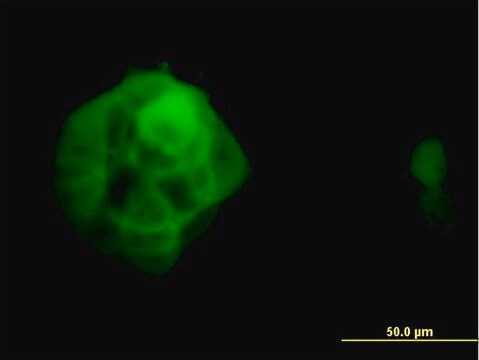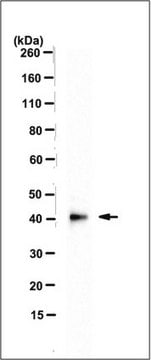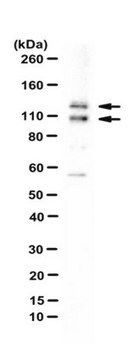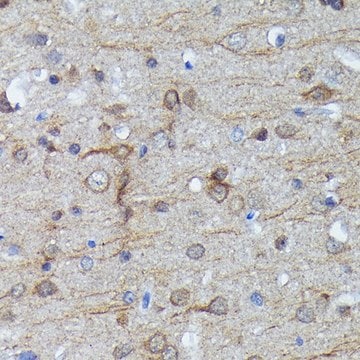MABN763
Anti-Ubiquilin 2 Antibody, clone 6H9
clone 6H9, from mouse
Sinônimo(s):
Ubiquilin-2, Chap1, DSK2 homolog, Protein linking IAP with cytoskeleton 2, PLIC-2, hPLIC-2, Ubiquitin-like product Chap1/Dsk2
About This Item
Produtos recomendados
fonte biológica
mouse
Nível de qualidade
forma do anticorpo
purified immunoglobulin
tipo de produto de anticorpo
primary antibodies
clone
6H9, monoclonal
reatividade de espécies
human, mouse
técnica(s)
immunocytochemistry: suitable
western blot: suitable
Isotipo
IgG1κ
nº de adesão NCBI
nº de adesão UniProt
Condições de expedição
wet ice
modificação pós-traducional do alvo
unmodified
Informações sobre genes
human ... UBQLN2(29978)
Descrição geral
Imunogênio
Aplicação
Neuroscience
Developmental Signaling
Immunocytochemistry Analysis: A representative lot detected Ubiquilin 2 in HeLa cells.
Qualidade
Western Blotting Analysis: 1.0 µg/mL of this antibody detected Ubiquilin 2 in 10 µg of U-251 cell lysate.
Descrição-alvo
forma física
Armazenamento e estabilidade
Outras notas
Exoneração de responsabilidade
Not finding the right product?
Try our Ferramenta de seleção de produtos.
Código de classe de armazenamento
10 - Combustible liquids
Classe de risco de água (WGK)
WGK 2
Certificados de análise (COA)
Busque Certificados de análise (COA) digitando o Número do Lote do produto. Os números de lote e remessa podem ser encontrados no rótulo de um produto após a palavra “Lot” ou “Batch”.
Já possui este produto?
Encontre a documentação dos produtos que você adquiriu recentemente na biblioteca de documentos.
Nossa equipe de cientistas tem experiência em todas as áreas de pesquisa, incluindo Life Sciences, ciência de materiais, síntese química, cromatografia, química analítica e muitas outras.
Entre em contato com a assistência técnica








